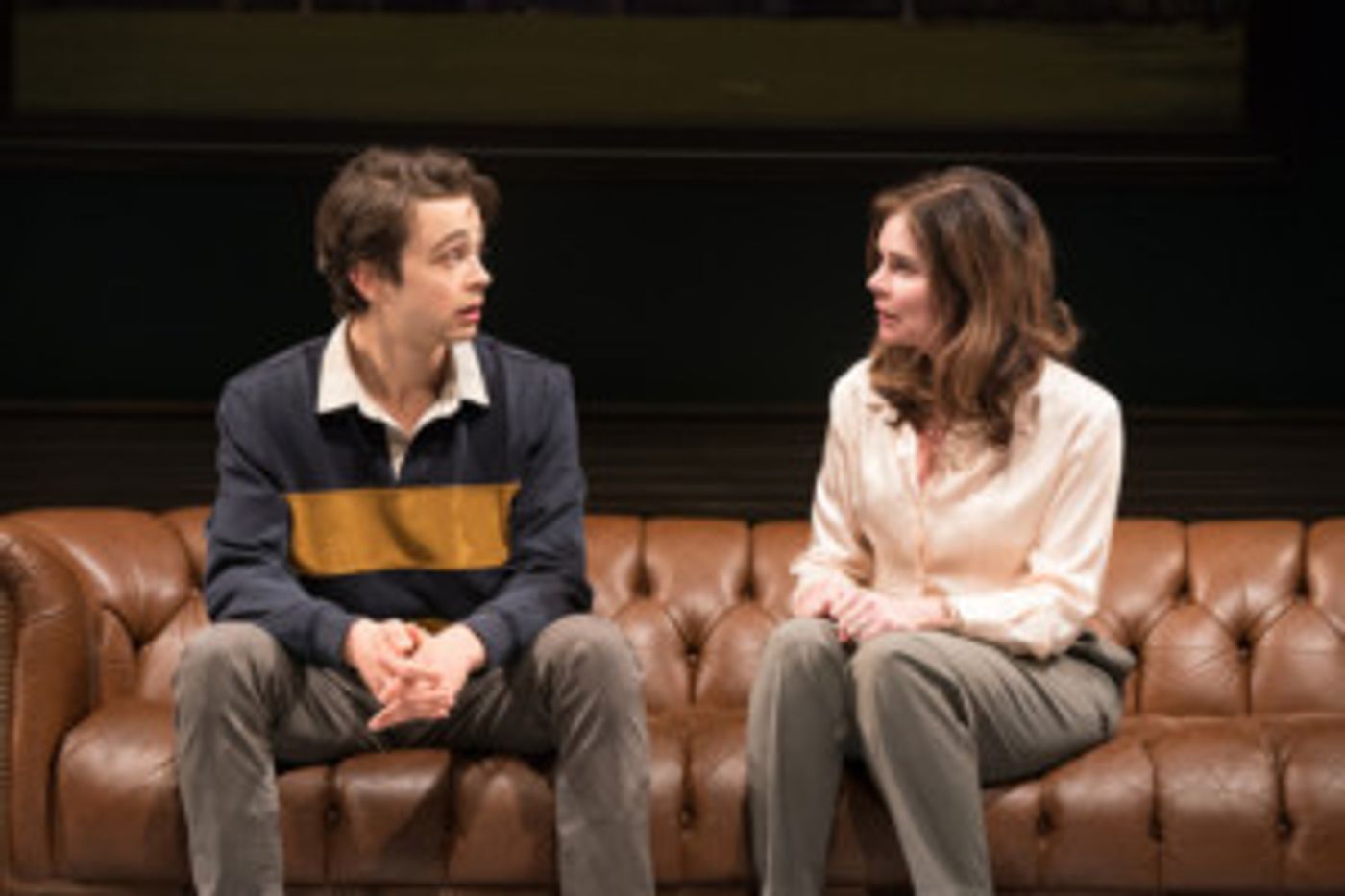Review: GOOD BOYS at Pasadena Playhouse

The great Frederick Douglass wrote, "It is easier to build strong children than to repair broken men." Roberto Aguirre-Sacasa (RIVERDALE) must have been thinking of something similar when he wrote GOOD BOYS, the new piercing drama at The Pasadena Playhouse. Though Aguirre-Sacasa's play debuted in 2008, it focuses on issues that have risen to the top of the country's consciousness with the #metoo movement.
At the close of the 1980s, Elizabeth (Betsy Brandt, LIFE IN PIECES) lives the vision of a perfect life. She's a trusted doctor, while her renowned doctor husband travels the world for a Doctors Without Borders-type organization. Her handsome son Brandon (Ben Ahlers) is a senior at a prestigious all-boys school as the captain of the football team. But Elizabeth's life is about to implode when a videotape circulating around the school features a girl and a boy who looks like Brandon in a sexual act, made even more ugly by the fact that only the boy appears to know they're being taped. Inuendo and finger-pointing inflame the situation, though Brandon swears he is not the boy on the tape. Elizabeth must call into question everything she believes about her family as well as admit to secrets from the past that she's long ignored.
GOOD BOYS stirs up issues with male privilege that struck American at its core during the Reagan years, where Masters of the Universe committed heinous crimes because they felt they were untouchable. But as a country, we continued to expose the malice between the sexes, with the Anita Hill hearings and William Kennedy Smith Rape trials and the philandering of President Bill Clinton in the 1990s, only to come to a head under the Trump years. More questions are being asked but none seem to have been resolved. The students at St. Joseph's Prep are destined for the Ivy Leagues and eventual wealth and power, and they are already taking advantage of the inequality they sense they deserve. Females are props, they're pets, they're disposable. These boys have been instilled with this toxicity; they've inherited it. Aguirre-Sacasa's plotting and dialogue portrays its protagonist as a kind person, one who knows right from wrong, but has been blind to the evil around her. Elizabeth goes through a roller-coaster ride of emotions, thoughts, and anguishes. She recognizes her culpability but doesn't allow the establishment to creep away either. Aguirre-Sacasa chooses to hide one character from the audience, the person most culpable, and it's an interesting choice, because that character becomes larger than life in the audience's mind, almost a boogieman. There is a subplot about revenge that only complicates the situation and could have been lifted from the drama. The reason for the revenge is tantamount to the story, but the vengeance itself feels more like a plot twist than an organic revelation.
Brandt handles Elizabeth's fragility and her bravery quite well. Her scenes with Ahler are as heartbreaking as those she shares with Brett Cooper as the girl whose reputation was demolished with that videotape traveling around the different schools. Ahler takes the audience through all facets of Brandon's personality, so that the audience is never clear what's a façade, what is a reaction out of fear, and what is his true face. Dylan Arnold, as Brandon's openly gay best friend, is heartbreaking as the wounded boy whose trust has been stolen. In a tumultuous scene, his lip quivers spontaneously, as if the actor himself as folded into the character. Brett Cooper is defiant as the young victim who just wanted to escape from her guaranteed flatline future.
Director Carolyn Cantor visually juxtaposes the opulence of the schools and homes to the neon sludge of the mall, the prison of the lower/lower-middle class workers. Dane Laffrey's posh set, with royal colors and imposing portraits of Jesuit priests and former academic leaders, rises to make room for the cold, neon cafeteria of the mall where the young victim languishes.
GOOD BOYS purposely focuses on Elizabeth, the mother of the boy in question, since she is responsible for his molding. The story is more concerned with her resolution and doesn't even bring Brandon into the final scene except through a flashback. Aguirre-Sacasa recognizes that the parents are the best filters to purify their children from bad lessons they learn from outside influences. Elizabeth understands where she's failed in her duties, and how only she can guide her son to a better adulthood. GOOD BOYS is a thought-provoking play about our past, present and unfortunately future, that will give parents a lot to ponder. Photo by Jenny Graham. GOOD BOYS is playing at The Pasadena Playhouse till July 21st. Tickets can be purchased at https://www.pasadenaplayhouse.org/event/good-boys/
Reader Reviews

Videos

